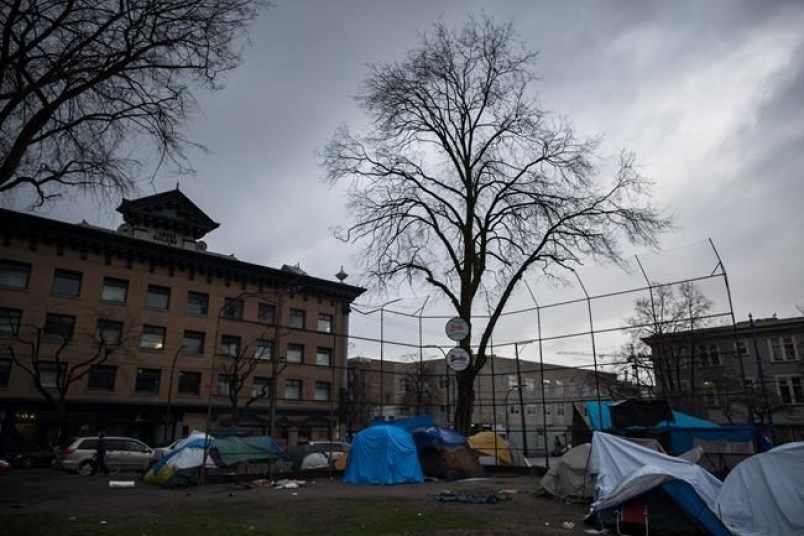The province has issued an evacuation order to remove hundreds of homeless people from British Columbia’s largest encampments in a plan that will see them transitioned into community centres and hotels left empty due to the COVID-19 pandemic.
The move, announced this morning (April 25), will include over 700 people living in tent encampments at Oppenheimer Park in Vancouver, as well as Topaz Park and Pandora Avenue in Victoria.
In an announcement, BC Housing CEO Shane Simpson said the camps represented an “elevated risk” for the transmission of COVID-19 as it’s become impossible to physically distance.
To make matters worse, Simpson said that in recent days, health care workers have been forced to withdraw their services.
Public health workers, police and non-profit outreach staff will provide oversight for the move, described as temporary until more long-term solutions can be put into place.
People will begin moving out of the encampments today, and with 20 to 30 people moved daily, authorities plan to have all camps evacuated by May 9.
The removal will be carried out under the Emergency Program Act triggered by Port Coquitlam MLA and Minister of Public Safety and Solicitor Mike Farnworth’s declaration of a provincial state of emergency.
“This is a public safety order, not a health order,” said Farnworth in an announcement Saturday. “As an order, police and other compliance officials are able to enforce any violations of this act.”
Security measures are rolling out to ensure the compliance and the evacuation order is not optional. A security perimeter will be established around the Oppenheimer Park encampment prevent anyone from entering, and those choosing not to leave will be in breach of the order and subject to fines, said officials.
While the province is willing to use police to enforce the order, officials expect voluntary compliance and said they have put into place a range of supports to help vulnerable people, including meals, medical care and ongoing cleaning to ensure a hygienic living space. Other measures include a safe and managed supply of drugs and alcohol, women-only spaces, and culturally appropriate supports for Indigenous people. The province also noted they have contracted a moving company to help bring along people's personal belongings.
The announcement comes within weeks of the fourth anniversay since the province first declared a public health emergency around the opioid epidemic. Since 2016, over 5,000 people have died in B.C. as a result of an overdose, often due to a drug supply tainted with opioids like fentanyl.
This, said BC Housing's Shane Simpson, is the first step in a plan to get the most vulnerable people off the street for good.
Provincial authorities say the temporary measures will remain in place for three to six months, and that over the long-term, those transitioned will be moved into more permanent housing, like the thousands of modular units currently under construction across the province.
The province did not reveal the cost of the move, but did note it falls under the government’s $5 billion response package to manage the COVID-19 crisis.
Beyond the encampments, health authorities across the province have secured hundreds of spaces for people without a safe place to live during the pandemic.



